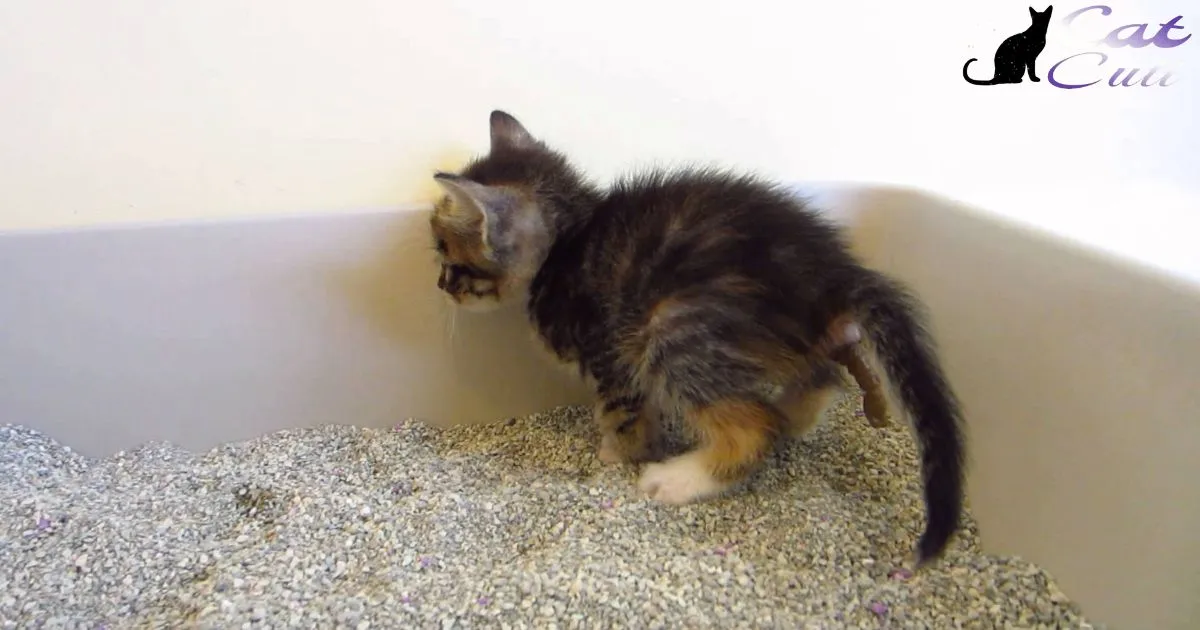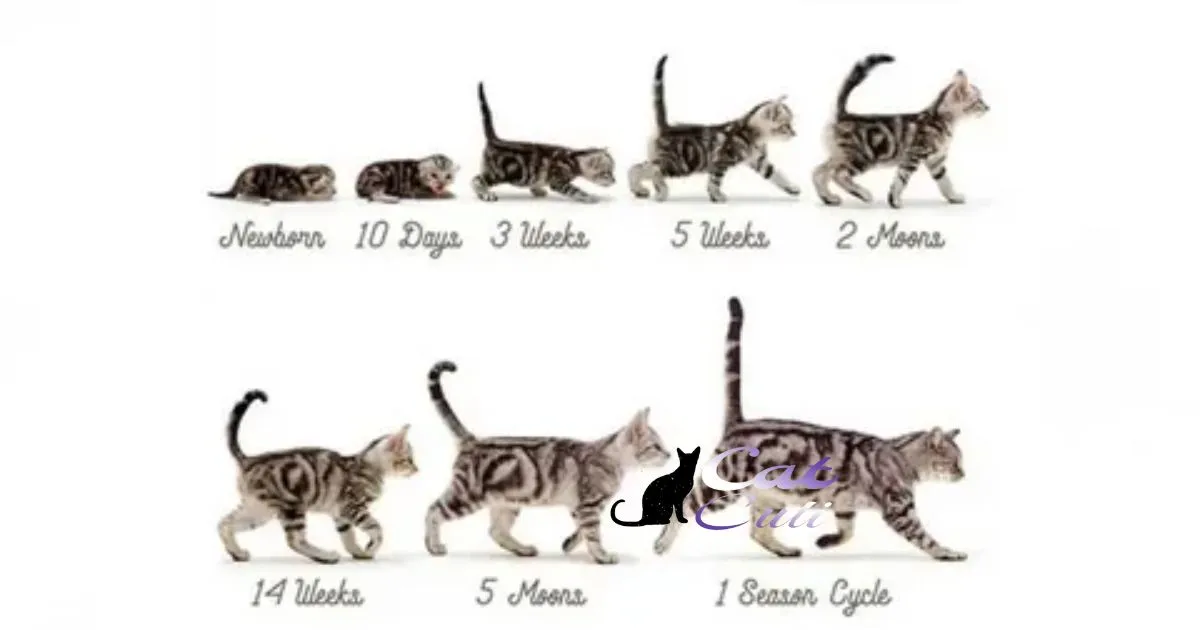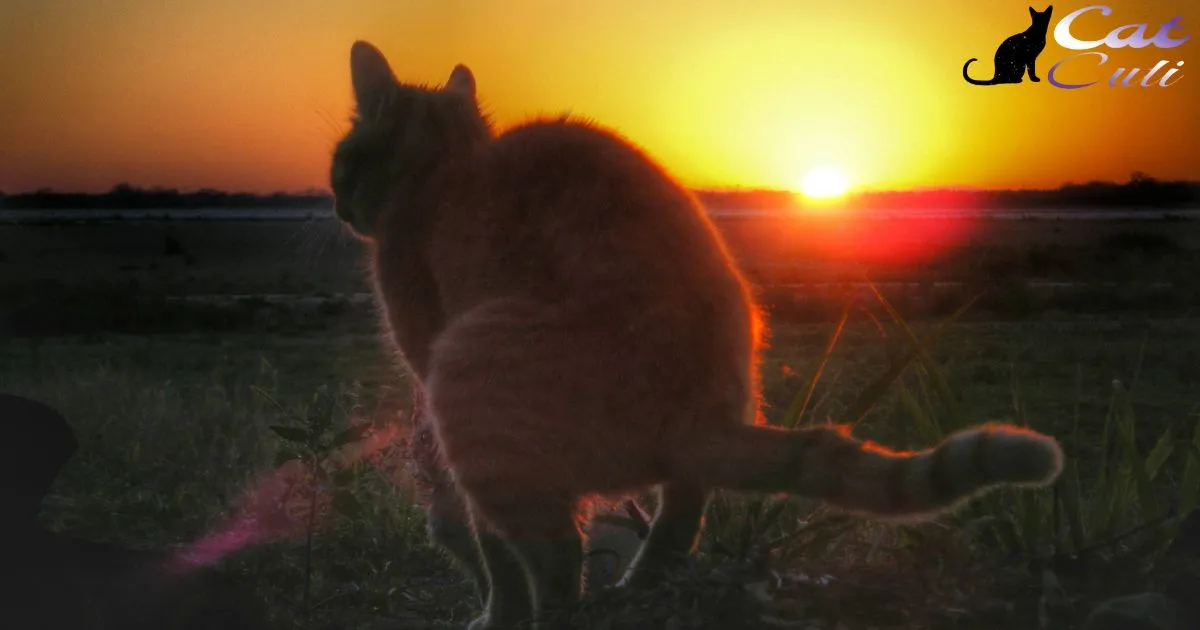Kittens exhibit some intriguing behaviors, especially around litter box training. One quirk that often perplexes new cat owners is when a kitten steps in its own poop while trying to bury it in the litter box. This clumsy misstep leaves kitty paws soiled and the owner scratching their head. Though unpleasant, this behavior stems from natural feline instincts around waste removal.
When nature calls, a kitten’s first instinct is to scratch and dig at the ground to bury their waste. This behavior dates back to their wild ancestors when cats would bury their feces to hide signs of presence from potential predators. Though our house cats live a cozy domestic life, those innate instincts still kick in when they use a litter box.
In their enthusiasm to cover up waste, kittens frequently overshoot their target and end up unintentionally stepping in poop with their back feet. Their poor aim coupled with the confined space of the litter box leads to this messy misfire. Though we cringe at the smelly results, it’s a common mishap in the life of a kitten still trying to figure out a precise litter box procedure.
Kitten Step in Poop When Burying
It’s a sight no cat owner wants to see – little kitten paws covered in poop after a visit to the litter box. As unpleasant as it is, this messy misstep is common among kittens still perfecting their waste burial skills.
Stepping in poop runs counter to a cat’s innate desire to keep clean. To understand this undesirable behavior, we have to look at the natural instincts and physical limitations that drive it. Once we know the root causes, we can take steps to help our kittens develop better aim and burying technique.
When Will Kitten Stop Stepping In Poop
To ensure their well-being during this developmental stage, it’s crucial for pet owners to be mindful of the products used in the litter box, such as choosing a mineral oil safe for cats.
As kittens mature, their motor skills improve. Their vision and depth perception gets better. With an expanded litter box and more practice, technique typically progresses. Soon litter burial becomes smooth and precise. By a year old, cats have mastered covering waste cleanly. Consistent poop-free exits signal success. Some kittens meet this milestone even sooner.
Contents
- What Triggers Poop Burial Instinct
- Physical Limitations of Kittens
- Small Litter Box Size
- Depth Perception Still Developing
- Lack of Motor Skills
- Solutions to Avoid Stepping in Poop
- Choose a Larger Litter Box
- Allow More Clearance Around Litter Box
- Add More Litter
- Gently Redirect During Burial
- Teach by Example
- Understanding Normal Kitten Development
What Triggers Poop Burial Instinct
A kitten’s desire to bury waste stems from ancient feline instincts. By hiding their poop, cats hoped to conceal signs of presence from potential predators. Feral and outdoor cats still exhibit this behavior today. They scratch out a hole, do their business, and then push litter or dirt on top to mask the smell.
Our domestic kittens retain this innate burial impulse as well.Wild cats also bury waste to avoid attracting other animals to their territory or den. The concern was that the smell could draw unwanted guests either seeking food or bringing danger.
Indoor kittens don’t face this threat, but their instincts don’t know that. Even generations removed from outdoor living, kittens arrive coded with this poop burial compulsion.
Kitten Keeps Stepping In Poop

Kittens step in poop due to limited skills. Their bodies are still developing. This causes messy accidents in the litter box. Many kittens outgrow this by 6 months old.
Here are common reasons kittens step in poop and solutions:
| Reason | Solution |
| Small litter box | Get larger box |
| Poor aim | Add more litter for soft landings |
| Unsteady legs | Gently reposition during burial |
| Imperfect vision | Let adult cats demonstrate technique |
As kittens mature, their coordination improves. By a year old, most cats have mastered clean waste burial. With patience and training, kittens learn good litter box habits. Soon poop-free exits become the norm.
Physical Limitations of Kittens
While the instinct to bury waste remains strong, a kitten’s body isn’t always up to perfect execution. A variety of physical and developmental limitations contribute to unintentional poop mishaps.
Small Litter Box Size
The confined quarters of a standard litter box don’t give kittens much room to maneuver. With their tiny bodies and big paws, there isn’t space to swing their legs without bumping into plastic walls. The box length also doesn’t account for an enthusiastic back kick sending litter straight into waiting poop.
Bigger kittens outgrow these cramped boxes even faster. Some extending scratching and flinging sends their feet right into the line of fire.
Depth Perception Still Developing
Human babies take about 6 months before their vision focuses and they develop depth perception. Kittens follow a similar timeline as their eyes and brain pathways mature. Without this ability, they struggle to gauge exactly where the poop sits versus where they aim their scratching.
Swinging a back paw out to shovel litter often over or undershoots. Coordination between what they see and where their limbs land is still a work in progress. This causes accidental contact with poop behind them.
Lack of Motor Skills
A kitten’s brain directs their body to bury poop, but their muscles don’t always obey smoothly. The connections between intent, limbs, and balance are still developing. Think toddler-level wobbliness and uncertain footing.
Their legs may start crossing as they turn or stumble on a sifting litter surface. They fall forward as they enthusiastically scratch behind them. These unsteady moments turn a litter box into an unexpected slip-and-slide situation right into poop.
Cat Keeps Stepping In Poop In Litter Box
When a cat steps in poop, it signals something needs adjusting. The litter box may be too small. Or it has too little litter for burial. The cat’s aim and balance is still developing. Or they feel stressed by a dirty box.
Solutions exist like a larger box. Or more litter for soft landings. Gently repositioning during burial helps too. Consistent cleaning keeps cats returning. As cats mature, coordination improves. By a year old, most bury waste cleanly. With tweaks to set up, stepping in poop usually lessens. And litter habits keep improving.
Do Cats Step In Their Poop
Cats do sometimes step in their poop. This happens most with kittens still developing coordination. Their strong instinct is to bury waste in litter. But their limbs don’t always follow through precisely. This causes accidental contact with poop behind them.
Even adult cats step in poop at times. The litter box may be too small or dirty. Or the cat ate something that led to loose stools. Medical conditions like arthritis can also cause issues. While unpleasant, it generally does not harm healthy cats. With adjustments to set up and training, stepping in poop usually lessens.
Solutions to Avoid Stepping in Poop
While a kitten stepping in poop causes temporary annoyance, simple adjustments make it less likely. As kittens grow bigger and more coordinated, their aim and stability improves. In the meantime, try these tips to keep your kitten’s paws poop-free.
Choose a Larger Litter Box
Get a box with more length and width to accommodate an energetic kitten. This gives them space to fling litter backwards with less risk of landing in poop. Rectangular pans offer even more real estate versus small, square trays.
Many cats prefer bigger boxes as adults too. So an upgrade now equips your kitten with a litter box suited for all life stages.
Allow More Clearance Around Litter Box
Position the litter box in an open area without walls or corners too close by. This keeps wayward litter or paws from bumping into obstacles during burial. You want to provide as much open space behind and around the box as possible.
Add More Litter
Fill the litter box with at least 3-4 inches of litter. This gives adequate depth for burying without hitting the bottom too fast. Extra litter also means softer landings if their feet slide off the poop pile.
Gently Redirect During Burial
If you catch your kitten mid-poop burial, gently reposition them if they start treading too close. A light touch on the hips to straighten alignment or nudge over a few inches avoids a messy misstep. It also helps imprint improved technique.
Teach by Example
If you have adult cats, let your kitten observe their burial process. They likely demonstrate better aim and coordination. Watching the meticulous motions of an elder cat provides an excellent how-to for young kittens. Mimicking usually kicks in quickly with positive results.
Cat Stepped In Poop How To Clean
When a cat steps in poop, it calls for gentle cleaning. First, trim fur around the mess if needed. Then use a soft damp cloth to wipe paws clean. Rub carefully but thoroughly until no traces remain. Reward with treats after.
For bigger messes in fur, washing works better. Run warm water in a sink or tub. Add a mild cat shampoo. Lather it gently through the fur. Rinse thoroughly afterward. Be patient and offer praise during the bath. Dry with a soft towel. Brushing later removes shed fur. Stay positive so kitty accepts future cleaning. With care and understanding, paw and fur messes wash away.
Understanding Normal Kitten Development

While exasperating, kittens stepping in poop while burying is very normal. It results from the gap between innate instincts driving them towards cleanliness and their still developing physical skills. As they grow bigger and more coordinated, litter box aim and burial technique continue improving.
With the right set up and patience on your part, kittens outgrow this messy phase. While accidents happen during training, don’t punish or shame them. This erodes the trust and open communication needed to master litter box use. Stay positive and offer gentle guidance instead.
With a few adjustments and maturity, your kitten’s burial process soon resembles a tiny construction worker. Smoothly digging, pushing litter with back feet, and packing it down with front paws to conceal waste. Once the coordination clicks, clean exits become the norm.
Frequently Asked Question
Why Does My Kitten Step in Poop When Burying?
Cats have an instinct to bury waste but kittens lack motor skills and coordination to always hit the target.
At What Age Do Kittens Stop Stepping in Poop?
Most kittens stop stepping in poop by 6 months old as coordination and litter box technique improves with maturity.
How Do I Stop My Kitten From Stepping in Poop?
Use a bigger litter box, add more litter for soft landings, gently reposition during burial and let adult cats demonstrate good technique.
Is Stepping in Poop Harmful for Kittens?
While unpleasant, occasional stepping in poop generally doesn’t harm healthy kittens. Thorough but gentle cleaning afterwards is important.
What If My Older Cat is Stepping in Poop?
In an adult cat, this could signal stress, vision issues, arthritis, litter box avoidance or need for retraining. Check with your vet.
Conclusion
When a kitten steps in poop, it’s unpleasant but normal. Their strong burial instincts collide with wobbly coordination. But with maturity, their kitten steps in poop mishaps lessen. As motor skills improve, technique follows. Soon litter feats become graceful. By a year old, smooth waste burial is mastered.
With some adjustments by owners, the transition quickens. Expanded space, added litter, and gentle guidance help. Consistent cleaning entices return. Through positive reinforcement, good habits stick. Understanding the developmental stage prevents frustration. Supporting success lets kitten steps in poop become a short phase.








